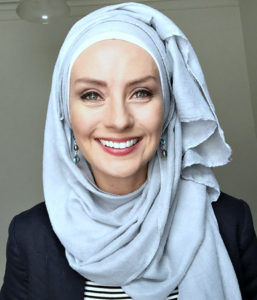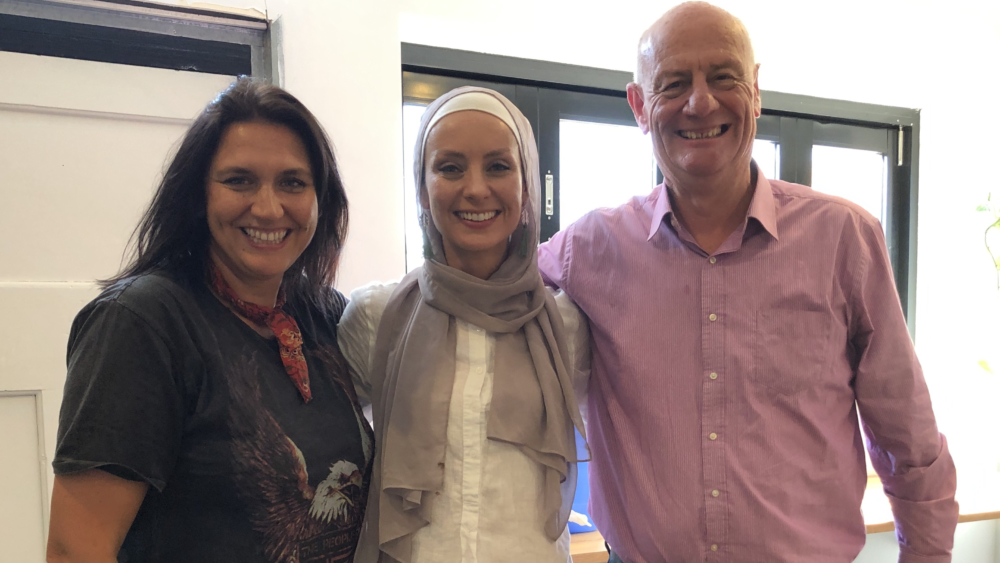Why Susan Carland converted from Christianity to Islam
And five stepping stones to help Christians and Muslims be friends
Susan Carland didn’t set out to become a Muslim. In fact, she was a believing Christian who describes her upbringing in the Baptist and Uniting church as “wonderful, positive” and without fault.
“I had the most amazing role models. Like, it was the flawless Christian experience that I wish everyone could have,” she enthuses.
And yet, at the age of 19 in first-year uni, Carland became so convinced about the Islamic faith that she decided to convert. Today, she has become one of Australia’s most recognisable Muslim women, as a social commentator, media personality, academic and author. And of course, she is also married to Waleed Aly, co-host of Channel Ten’s The Project and also a prominent Muslim spokesperson.
 Carland revealed why she made this momentous decision and how it has shaped the rest of her life in an episode of Eternity’s new podcast series The Good Vote. Here she shared with hosts Tim Costello and Mel Wade about her reluctant but compelling journey to a faith which she previously thought to be “horrible”.
Carland revealed why she made this momentous decision and how it has shaped the rest of her life in an episode of Eternity’s new podcast series The Good Vote. Here she shared with hosts Tim Costello and Mel Wade about her reluctant but compelling journey to a faith which she previously thought to be “horrible”.
“It was something that I really resisted … I didn’t want to become Muslim per se. I thought everything I knew about Islam looked horrible. But I think intellectually it sort of appealed to me first. The more I read about it, when I sort of tried to stop listening to all the noise and sought out ‘what does the faith seem to be saying about itself?’ (as much as a religion can speak for itself), it was very different to what I thought and very appealing.”
“If you look at all of our conversations about Islam, it’s talked about as a political identity … They never ask about the religious stuff.” – Susan Carland
As a mum of two, Carland now understands why her parents “weren’t thrilled” about her newly-found faith.
“As a parent now myself, I can only imagine if one of my kids came home and said ‘I’ve joined this thing that you don’t know much about and what you do know looks horrendous.’ I’d be quite concerned too, so I can understand. At the time I was like, ‘Gee, Mum, just let me live my life!’ but now, as a parent, I get it.”
Having reached a point in her life when she has been Muslim longer than not, you could assume it gets easier. But, as the podcast explores, misconceptions about the Islamic faith abound as the grip of “Islamophobia” tightens across the world, attested to by the March mosque attacks in New Zealand.
Australia is certainly not immune, with new research revealing that over half of Australians (51 per cent) feel negatively about Islam, and only 10 per cent see this religion in a positive light – meaning Australia has one of the most negative attitudes towards Islam in the world.
Beyond the numbers, the media is now increasingly reporting real-life examples of racism towards Muslims, with one of the most recent being the hate speech spewed at the 15-year-old daughter of NSW Labor education spokesperson Jihad Dib at her soccer match in Sydney.
“If you asked someone walking past now, ‘How does an Islamist differ from a Muslim?’ they would have no idea.” – Susan Carland
Carland puts this negativity towards Islam down to a lack of understanding. “I think a big part of the reason for that is, if you look at all of our conversations about Islam, it’s talked about as a political identity. So people will always ask about jihad or ‘What’s sharia?’ or ‘Why do you wear a hijab?’. They never ask about the religious stuff: ‘How is Islam a spiritual guidance?’; ‘What is the religious manifestation of it?’. And so, if we’re always talked about as a political ideology, then of course people won’t connect with it as a religion.
“I think for the average person on the street, if you asked someone walking past now, ‘How does an Islamist differ from a Muslim?’ they would have no idea. None. Like they’d be, ‘I guess it’s the same. Islamic fundamentalist? Maybe they’re all the same?’ … I think there is such low-level literacy about Muslims and Islam at the moment.
“And it’s a tricky one for the Muslim community because I know, particularly post-September 11, the Muslim community feels they’ve been working incredibly hard to try to change the narrative. But, in the end, only 2.6 per cent of Australia is Muslim. It’s a tiny fraction, which means the average Australian will never have a Muslim friend, neighbour or colleague. So their sole source of information about Islam is the media. And most of that is ISIS, and the burka ban, and ‘halal is actually funding jihad’. And that’s it. They’re not actually getting to know Muslims as people.”
” When you are very secure in your own faith, you’re not threatened by other people’s.” – Susan Carland
As the podcast conversation unfolded, Carland identified several key similarities between the Christian and Muslim faith. Costello agreed, saying: “You know sometimes Christians I meet who have Islamophobia … I say to them ‘Well, who actually is concerned about pornography or marriage breakdown?’ The answer is ‘Muslims’ … there’s so many parallels.”
For Christians and Muslims to “be friends”, we simply need to grow in understanding about each other, says Carland.
“I think when you are very secure in your own faith, you’re not threatened by other people’s. There’s no sense of unease – and that includes people of no faith …
“We don’t have to have everyone be the same as us to like each other. And I think we are so in our own silos at the moment, and we’re so in our own tribes – it’s the worst it seems to have ever been. And if we can just let go of this idea that ‘You have to be exactly like me for us to get along,’ then there is no problem.”
5 ways in which Islam and Christianity are alike:
1. Our beliefs are open to misinterpretation from those outside …
“I think when there is the question that people either can’t get an answer to – or don’t feel they can get an answer – that’s when they just fill the vacuum with their own ideas,” says Carland.
She adds: “Part of the problem is – and this isn’t just unique to the Muslim community – that when religious leaders seem to pipe up in the media, it so often it seems to be about horrible things. And I think that’s why religious people in general have such a bad reputation.”
2. … and those within
“Westboro Baptist [a US church that gained notoriety for hate slogans and actions targeting Muslims and same-sex attracted people], I think, is a great example. They’re kind of like the ISIS of the Christian world. I mean, they’re not killing people, obviously, and I’m not trying to minimise that. But it’s the same, you know, Westboro Baptists would be adamant that they are purely biblically based and have a biblical justification for everything they do – doing horrendous things like protesting funerals and the signs they hold up. In the same way that … ISIS would be like “Absolutely, this is koranically based and this is how we justify it.” But then how can you get ISIS and the Persian poet Rumi reading the same religious texts and coming [out] with such different interpretations? Or Tim Costello and Westboro Baptist? It’s the same text …
“Religions do not speak for themselves. Humans bring their lens and all that background and baggage … to this – what we believe, obviously, [are] divine texts – and then we grapple with ‘What is the divine really saying here?’ And, of course, you’re going to get a multitude of different interpretations, some great and some horrific.”
3. We’re counter-cultural
In discussing why she wears a headscarf (or hijab), Carland answered that it’s “an act of worship”: “Modesty is – in behaviour and in dress – a big part of Islam for men and women. And that’s quite counter-cultural at the moment. It’s not really a good thing to be modest and it’s seen as outdated; it’s seen as repressive. Even in terms of behaviour, you know, if we look at our social media world, it’s the antithesis of modesty … so it does seem a bit weird and awkward to people … But for me, it is an important part of my faith.”
4. Everything we do can be an act of worship
“So there are the obvious, very understandable acts of worship. You know, the five daily prayers, for example, where … it’s the mind, body and spirit all in submission with the movements we do. And, obviously, we have Ramadan where we fast for a month. So those are the obvious acts of worship.
“But … ideally in Islam everything would be an act of worship if we have the right intention, and if we are conscious. So there are prayers that we can say before we get dressed, before we eat, before we take a journey, before we start the car.
“And to some people that might sound quite immature, or you know, ‘Why do you need all these rules everywhere?’ For us, I suppose, it’s about a constant reconnection to God, to the divine. That you know, our human nature seems to be a forgetful one. We constantly sort of drift away from God … So it’s a constantly bringing ourselves back and reminding ourselves. Kind of like checking the compass … and again reminding us ‘Where am I going?’ ‘What is my intention in doing this?’”
5. We are called to use part of our income for others
In comparison to the biblical concept of tithing, giving 10 percent of our income to the church, Carland explained the Islamic tradition of Zakat: “It’s something that Muslims have to give. It’s not optional; we have to actually give it. It’s meant to be 2.5 per cent of our accumulated wealth – above a certain point, so if someone’s very poor they don’t have to pay it, so from a sort of … minimum threshold.
“And you’re giving it to the poor and needy. [It] doesn’t have to necessarily be Muslims that you give it to, just people who need it … And the idea is that that money isn’t actually ours – it belongs to them … It would be an injustice of us to withhold it from the people who it belongs to.”
Hear the full conversation between Susan Carland, Mel Wade and Tim Costello on Episode 4 of The Good Vote.
Email This Story
Why not send this to a friend?


